CIA Sponsored Terror, Civil Liberties, FBI Intrusion, Human Rights, Political Prisoner, Prison Industry, Surveillance, Torture
Podcast: Play in new window | Download


Prison State of America: Chris Hedges, Earl Amin, Amos Caley
Today we hear from 3 extraordinary people that will move you to anger, tears and outrage. Chris Hedges is an award winning journalist and former New York Times Middle East bureau chief . His recent article is Prison State of America outlines in detail how prison workers are gouged by corporate run private prisons. Earl Amin is a former Black Panther who was sentenced to life in prison for conspiracy to commit robbery and served 35 years which is the longest sentence in the state of New Jersey. Amos Caley is with the Interfaith Prison Coalition and a graduate student in the School of Social Work and is with the National Religious Campaign Against Torture, that exposes the abusive practice of solitary confinement in New Jersey prisons
Chris Hedges:
- What we’ve seen in the last few years is a steady assault, economic assault against prisoners and their families.
- Your minimum wage is about $1.30 a day. 8 hours of work, you’re doing prison labor, you work for the state. You’re paid a 1.30.
- They pay you for 5 days a week. That’s about 28 dollars a month.
- Deodorant, stamps, toothpaste, all of this stuff has risen by in many cases over 100 percent.
- Wages in the society at large have remained stagnant and in real terms declined and yet the commissary items have gone through the roof.
- The standard footwear are Reeboks, which cost 45.00. If you don’t have 45.00, they will sell you these sneakers with cardboard soles. The first time you go out in the yard, they’re shredded.
- If you don’t have any money, the prison system has thoughtfully provided a loan system so you can go into debt peonage.
- We have seen private corporations take over the phone system.
- We have seen the removal of other items like thermals. They used to give two blankets, now they give one.
- They’ve also privatized the system where you put money on a prisoners account. Jpay. Again charging draconian fees.
- Remember, we’re talking about very very poor families.
- What we’re seeing now is larger and larger numbers of people within the system who are not only broken, because most families don’t have the resources to send money in those incarcerated, because most of the incarcerated were the primary wage earner, people are going into debt.
- You have a 10 thousand dollar fine imposed on you when you’re sentenced. You’re earning 28 dollars a month, you have no outside resources.
- 25 years later, this is an actual case, you still owe 4 thousand dollars.
- People are finishing prison in debt. The very forces of predatory capitalism that are destroying working men and women outside the walls of prison, are running rampant inside the walls of prison.
- That is a kind of window of what’s going to happen to rest of us.
- Much of the military equipment is produced by federal prisoners – Kevlar jackets, body armor, canteens, etc
Guest – Chris Hedges, Pulitzer-Prize winning author and journalist. He was also a war correspondent, specializing in American and Middle Eastern politics and societies. His most recent book is ‘Death of the Liberal Class (2010). Hedges is also known as the best-selling author of War is a Force That Gives Us Meaning (2002), which was a finalist for the National Book Critics Circle Award for Nonfiction.
—–
Earl Amin:
- In 1967, I was drafted right out of high school into the Army.
- I met this white kid from Boston and he said Earl let’s go into town tonight which is Augusta, they some bad cats out there, I want you to meet them.
- I thought he was talking about Motown, Temptations, I never thought he’d talk about the Black Panthers. I went out there and heard these guys talking about the government.
- Later on I was transferred to Fort Dix, New Jersey – went to Central Park with my sister, Angela Davis was speaking. I had on my Army uniform. She said brother are you in the Army, I said yea. You been to the South? She said you don’t need to be this army you need to be in our army.
- I went AWOL that day. I joined the panthers that day until the FBI caught up with me six months later and charged me with being AWOL and sent me to Fort Leavenworth.
- I stayed there about nine months and they released me, went back to being a panther again, came home.
- Later on I was involved with something called Operation Breadbasket out of Chicago. We was out there feeding the poor people. I was out there when Fred Hampton was killed.
- I got arrested for guns. I went back to prison for a few months and came out.
- Then I got arrested for conspiracy to commit bank robbery, just talking about it. I was given a life sentence.
- I went to New Jersey State prison, Trenton.
- I started doing a lot of para-legal work and helping a lot of other people get out of prison.
- One judge told me if I was sentencing you today, I would give you 3 years.
- I was the first person in the history of the state to be sentenced to life for a robbery charge.
- Being 65, I took a job as a construction worker working 2 days a week, barely enough.
- I was listening to POP, Peoples Organization for Progress, with Larry Ham.
- For years and years I’ve earned a dollar thirty a day.
- That’s one of the problems, I’m comin home. I can’t get social security cause I ain’t paid nothing into social security.
- I can’t get a job because of my age, so what am I supposed to do?
- If you didn’t work, you didn’t get no toothpaste, you didn’t get no coffee.
- I personally, filed my own divorce.
- Rubin Hurricane Carter was my hero. Rubin resisted everything.
Guest – Earl Amin, a former Black Panther who was sentenced to life in prison for conspiracy to commit armed robbery. Earl has been released from prison after 35 years.
—–
Amos Caley – Interfaith Prison Coalition
- We’re realizing that talk is cheap. Looking at people who are most affected, and what they’re doing in terms of mobilizing themselves around this, is really a key to creating a sustained grassroots effort against the (predatory capitalist) system.
- We really have to organize around the demands of the families and the victims.
- That’s what the Interfaith Prison Coalition is about.
- One of things we’re doing is mounting a campaign to make it so that prisoners are paid minimum wage.
- We’re talking about a minimum wage for service workers on the outside, which will have a huge impact.
Guest – Amos Caley, a graduate student in the School of Social Work and is with the National Religious Campaign Against Torture, that exposes the abusive practice of solitary confinement in New Jersey prisons.
————————————————————

Please help support Law and Disorder by clicking on Fractured Atlas graphic (link is fixed). This radio show is now a sponsored project of Fractured Atlas, a non-profit arts service organization. Contributions for the charitable purposes of Law and Disorder must be made payable to Fractured Atlas only and are tax-deductible to the extent permitted by law. You can donate as little as 5.00 a month.
CIA Sponsored Terror, Civil Liberties, Criminalizing Dissent, Habeas Corpus, Human Rights, NSA Spying, Political Prisoner, Prison Industry, Surveillance, Targeting Muslims, Torture
Podcast: Play in new window | Download
Updates:
- Hosts Look Back At Several Legal Cases Of 2014
- Professor Steven Salaita Case Update
- Palestinians Join International Criminal Court After UN Rejection
- Michael Ratner: There Is An Immediate Jurisdiction In The ICC On The Occupied Territories
- Michael Ratner: Guantanamo Statistics 2015
- Michael Ratner: Afghanistan War Ends?
—–
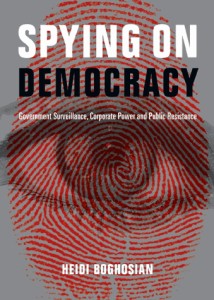
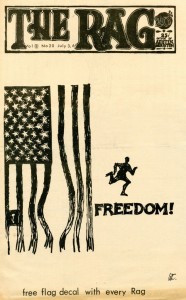
Dissent Under Surveillance: Heidi Boghosian
“Dissent Under Surveillance” was a panel held on November 7th at the Cooper Union in NY. It featured our own Heidi Boghosian, along with panelists Kevin Gosztola, Lisa Lynch, Ryan Shapiro and Carey Shenkman. Carey has been a guest on Law and Disorder. The panel was part of The Clandestine Reading Room, an exploration of leaked and declassified documents shedding light on government surveillance and secrecy in the US.
—-
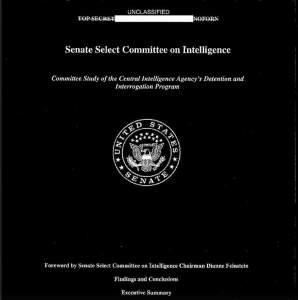
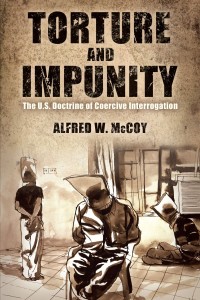
How To Read The Senate Report On CIA Torture
We welcome back author and professor of history at the University of Wisconsin, Al McCoy who recently published the article titled How to Read The Senate Report On CIA Torture. He calls it the single most important U.S. government document released to date in this still-young 21st century, yet its not without particular failings. McCoy distills the report into several potent areas. Among them, he points out how the report shows the “perpetrators as mendacious careerists willing to twist any truth to win a promotion or secure a lucrative contract.” Another is that the CIA has now been forced to admit that any link between torture and actionable intelligence is “unknowable.”
Professor Al McCoy:
- The report gives us a graphic record of just how brutal the CIA interrogations were.
- For years now we’ve been saying enhanced interrogation techniques or the acronym EIT’s or techniques which some consider to be torture, all kinds of twisted euphemisms. Well now, thanks to the senate report on the CIA on interrogation and incarceration everybody, citizen and senator alike, just say torture.
- Another aspect that emerges from the report is a graphic description inside the worst of the CIA managed prisons, the salt pit in Afghanistan. The cold and eternal darkness, the capricious brutality of the CIA interrogators. The absolute incompetence from the point of modern incarceration of the CIA junior prison managers who were sent out without training to run this prison.
- Through all of that the salt pit in Afghanistan can join that long lineage of state human cesspits of suffering.
- Another thing and I think the most important contribution of the senate report is to establish that all the CIA’s claims that brutal coercive interrogation somehow kept us safe, blocked terrorist plots, led us to Osama Bin Laden.
- No longer can the CIA claim the techniques work.
- There’s one little detail that doesn’t seem that important analytically that sticks out and becomes absolutely iconic.
- The iconic part of that report is the fact that the CIA paid 81 million dollars to 2 retired military psychologists who had no training, no language skills, no nothing. These 2 mediocrities are given 81 million dollars to run the CIA psychological and interrogation program.
- The Senate tells us there’s this female operative that was responsible for one of the biggest bungles of the war on terror. The seizure off the streets of a German national named el Mazri. He was rendered to the salt pit in Afghanistan and for 4 months he suffered the vicissitudes of that horrific prison, that iconic hell hole. Then the CIA figures out, oops. This is a complete mistake. This guy is not in any way a terrorist, and they literally dump him on a mountain top in Albania with a wad of cash and have a nice day.
- That operative then also claimed in testimony to the CIA inspector general in 2004 who was investigating the abuses inside the agency’s prisons that these techniques were working. The brutal interrogation, the water boarding of Khalid Sheik Mohammad the top al-Qaeda suspect had led the agency to another suspect named Majid Khan.
- It turned out that Majid Khan was already in CIA custody before the interrogation. Her statement was completely bogus. Who is this person?
- The CIA drew upon her primarily we believe to make her this fictional female CIA operative in Zero Dark Thirty this hero, whose almost obsessive pursuit of Osama Bin Laden and her participation in torture sessions led the Navy Seals to kill Osama Bin Laden in Pakistan.
- Her name is Alfreda Bikowski. She was the one who missed the signals on the 911 plot before it happened.
- She gave systematic false testimony as I described. She led the CIA on a false goose chase on a supposed terrorist cell in Montana and for all that she’s been promoted to the equivalent of a CIA rank as a one star general.
- In 2012, this civil servant had bought an 875 thousand dollar house in Virginia, a luxury residence.
- In short, instead of being reprimanded, demoted, punished for this cacophony of errors, the CIA operative had been rewarded.
- (the senate report) they don’t really explore the history, they don’t tell us where did this psychological torture come from.
- Where did this institutional reflex for torture come from? It comes from a 60 year history of the U.S. involvement of torture.
- The CIA was desperately afraid that the Soviets had somehow cracked the code of human consciousness.
- The sensory deprivation, the sensory disorientation leads to a very quick breakdown.
- Torture up to but not death was legal, and that’s what allowed the CIA to do all this.
Guest – Professor Alfred McCoy is the author of two recent books on this subject—Torture and Impunity: The U.S. Doctrine of Coercive Interrogation (University of Wisconsin Press, 2012) and A Question of Torture: CIA Interrogation from the Cold War to the War on Terror. Welcome to Law and Disorder.
———————————————————-

Please help support Law and Disorder by clicking on Fractured Atlas graphic (link is fixed). This radio show is now a sponsored project of Fractured Atlas, a non-profit arts service organization. Contributions for the charitable purposes of Law and Disorder must be made payable to Fractured Atlas only and are tax-deductible to the extent permitted by law. You can donate as little as 5.00 a month.
CIA Sponsored Terror, Civil Liberties, Criminalizing Dissent, Gaza, Guantanamo, Habeas Corpus, Human Rights, Political Prisoner, Surveillance, Torture, Truth to Power
Podcast: Play in new window | Download
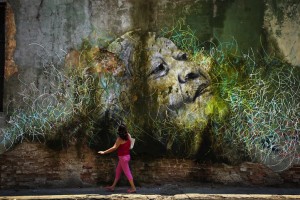

U.S. Cuban Foreign Policy Changes Strategy: Normalizing Relations
We’re joined today by attorney Michael Krinsky, a partner in the famous law firm of Rabinowitz, Boudin, Standard, Krinsky & Lieberman. This the firm that almost has been from the beginning representing the government of Cuba. We speak with Michael about the dramatic reversal of policy and the recognition by the United States of the Cuban government and the eventual establishment of joint embassies. We also speak about the returning to Cuba of the three remaining anti-terrorist Cuban fighters who have been in American prisons for 16 years. Three men of the Cuban Five. That, plus we discuss the changing of the commercial relationships between the United States and Cuba.
Attorney Michael Kinsky:
- It was an extraordinary moment. Word got around that Raul Castro was going to talk to the Cuban people on television at Noon, so everyone ran to find a television, including me.
- I think many people expected Obama to take some minor measures to test the waters perhaps to get things moving.
- Most people were quite surprised about the tone of his speech and what he said.
- I happen to be at a conference of US and Cuban scholars, which were talking about US-Cuban relations, that’s where I saw President Castro’s speech. The first thing he said of course was the cuban heroes. The 3 of the remaining Cuban Five and the place broke into pandemonium. People jumped up literally hugging each other. People were crying, then they quieted down and they listened to the next thing.
- And then when he said President Obama and I have agreed to reestablish normal diplomatic relations. There was silence. Then people half a second later absorbed and again there was a tremendous commotion.
- People felt a sense of triumph. After 55 years of holding despite the Bay of Pigs, despite the economic blockade, despite the special period when the trade with the Soviet Union collapsed, they had held on. In the end, someone put it, the United States came to us.
- You could see it in the streets, you could see it in the restaurants, you could see it in the offices. People were happy.
- They were literally smiling for days afterward.
- The embargo has been in effect for 54 years. It’s as comprehensive an embargo as this country has ever imposed, as any country has every imposed against any country.
- It’s not simply the US saying we the United States won’t trade with Cuba. A major part of it is extra-territorial reach. The effort for Cuba to make trade with third countries difficult and impossible.
- They can’t get US parts for their equipment.
- They can’t use US dollars for international transactions, which is the currency of international trade.
- Shipping to Cuba is made extremely difficult because of the US law that says if a ship goes to Cuba it can’t come to the United States for six months.
- Everyone in Cuba lives on a daily basis what they rightfully call a blockade.
- A blockade implies an effort to interrupt, disrupt trade between Cuba and a third country.
- There is nothing there about Cuban products being sold in the United States. It’s all one way.
- Cubans have developed a lot of innovative medical products that doctors are very excited about.
- There was nothing in the announcements about regular airplane service between the two countries.
- (Michael Ratner: The president has the authority to license almost everything, every economic transaction with Cuba at this point)?
- Right export, import, financial transactions, loans, credits, investments, all of these things are within the president’s licensing authority.
- The United States did not want a left wing socialist revolution to succeed in the Americas.
- The theme publicly and internally in the US government, until about 1991, 1992 and then there was a shift. Then for the first time, the United States publicly started talking about the goal of US policy including the blockade was to change the internal character of the Cuban system. The Cuban government.
- Civil liberties, free elections, free speech – those became for the first time the articulated goals of US policy.
- Guantanamo Bay used to be a Naval Station for coaling, ships operated on coal then. There was a 99 year lease between a captive Cuban government and the United States.
- I’m trying to find the right balance between a great deal of enthusiasm and not necessarily skepticism, but caution.
- It was nice to see the State Department make reference to this, the United States has claims for the nationalization the properties of its companies in Cuba in the early days. Cuba has articulated it has much greater claims against the United States for the blockade and for acts of economic sabotage which have died actually over the years.
- There are claims on both sides that have been articulated in the past.
Guest – Attorney Michael Krinsky, has been practicing law for forty-five years. For three decades, he has led the Firm’s representation of Cuba and other foreign governments, and their agencies and enterprises, as well as the Firm’s practice in the area of U.S. embargoes and export controls. Mr. Krinsky graduated from the University of Chicago’s College in 1965 and its Law School in 1968. After working with the American Civil Liberties Union in Newark, New Jersey, he joined the Firm in 1971.
——
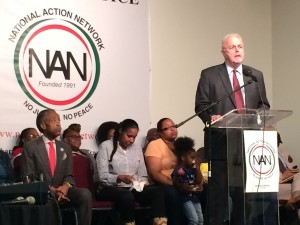
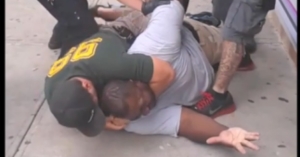
NYPD Unions Respond To Police Shootings, Says Protests At Fault
In the wake of the killing of two NYPD officers, a rift has widened amid police unions and the mayor of New York City. The New York City Police Benevolent Association Officers has suggested that the recent demonstrations against police misconduct and police violence have played a role in the execution style murders. To discuss the rhetoric from the police union and the tabloid media, we’re joined by attorney Jonathan Moore.
Attorney Jonathan Moore:
- It is a critical moment here in New York City and around the country on the issue of dealing with over aggressive policing and the militarization of police, I think they go hand in hand.
- We’ve been fighting this battle in New York for at least 15 years going back to the killing of Amadu Diallo and litigated the stop and frisk cases until the end of last year in to this year.
- Police unions have been an absolute impediment to any reform of the police department in the city of New York over the last several years.
- The union of that police department doesn’t reflect the membership anymore. The police department is close to being majority minority. Patrick Lynch is the vestiges of the old guard who never saw a police officer who did anything wrong.
- The overwhelming majority of these protests have been peaceful and law abiding. They have not been about calling for the death of police officers. They’ve been about calling for fair bias-free, constitutional policing.
- To use the death of these two officers as an attempt to stifle what as you say is growing mass movement, that hasn’t been seen in many years, is unfortunate and should be resisted.
- I’m glad that people are out there, these are important issues.
- The daily use of excessive force that goes on in many communities is never registered, never gathered by the police department. That’s a problem.
- The systemic problem is a culture within the New York City police department that has adopted an us against them mentality.
- There has to be a cultural change within the police department.
- In 2011, the police department was doing close to 700 thousand stops and frisks a year. The fear was that if you impeded the stop and frisks in the way they were doing it. We of course they were doing it based on race, and the federal court found that.
- Their alarmist response was if we stop doing stop and frisk, the crime rate will soar.
- They did 50 thousand stop and frisks this year, that’s down 650 thousand. That’s because they made a change. They stopped imposing quotas on police officers.
- By the way, on the pace of doing 50 thousand this year, and crime is still going down.
- What does that tell you. It tells you for all these years, they were unnecessarily harassing and stopping and frisking, young black men and young Hispanic men, mostly in our communities for no good reason.
- These unions blindly defend officers when they engage in misconduct and that hurts all police officers, all correction officers.
- In an organization like the NYPD of 35 thousand sworn officers, there are going to be people who don’t do what they should do. They should be rooted out and removed from the police department.
Guest – Attorney Jonathan Moore, is a civil rights lawyer known for his work in the stop and frisk suit against the city and representing 3 of the 5 wrongly convicted men in the Central Park jogger case in 1989. He is now representing the family of Eric Garner, a father of six who died from a police choke hold.
—————————————————

Please help support Law and Disorder by clicking on Fractured Atlas graphic (link is fixed). This radio show is now a sponsored project of Fractured Atlas, a non-profit arts service organization. Contributions for the charitable purposes of Law and Disorder must be made payable to Fractured Atlas only and are tax-deductible to the extent permitted by law. You can donate as little as 5.00 a month.
CIA Sponsored Terror, Civil Liberties, Criminalizing Dissent, Cuba, Guantanamo, Habeas Corpus, Human Rights, Military Tribunal, NSA Spying, Political Prisoner, Prison Industry, Prosecution of the Bush Administration, Surveillance, Torture, Uncategorized, War Resister
Podcast: Play in new window | Download
Updates:

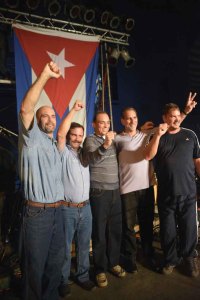
New Cuba-U.S.A. Pact And Remaining Cuban Five Prisoners Released
Attorney Michael Ratner:
- We’ve been covering this case for years on here. They were wrongfully convicted. They had been sent into Miami to stop Miami-Cuban terrorism against Cuba.
- The U.S. in a vindictive prosecution had sentenced them for many years, in fact one of them was sentenced to life in prison for conspiracy to commit espionage I think.
- It’s all part of a larger picture of what’s going on.
- Cuba in what’s not considered an exchange, of course obviously, released Alan Gross.
- Obama within limits sounds like he’s going to open relations within a certain way with Cuba and open an embassy in Cuba and Cuba, one in the United States.
- It’s amazing moment, the revolution took place in 1959, so that’s only 55 years ago approx, the embargo has been in effect since 1961. It’s still in effect of course but this is a really major moment.
- Attorney Len Weinglass would take 1 or 2 cases at a time, work on them like a dog, whether it was Mumia or in this case the Cuban Five and put every piece, every part of his life into it.
——
Attorney Heidi Boghosian:
- In the U.S. we continue to see the news portraying the five as spies when like you said they were really here to uncover unlawful activities on the part of the U.S government.
- They handed over files to the FBI, they were very forthright with the information they gathered.
- We also know from our interviews with attorney Mara Verheyden-Hilliard and Gloria LaRiva that the U.S. has been paying journalists in Miami to report negatively on the case of the Cuban Five and were doing so at the time of their trial.
- One of the lawyers we used to interview on this show and a close friend of ours Lenny Weinglass who passed away a couple of years ago was the main lawyer for the Cuban Five. It then became Martin Garbus who carried on the case in an extraordinary way, and I think that all of their work and all of the work of the Committee to Free the Cuban Five has led to result that I think would have been unforeseeable 20 years ago.
——
Civil Forfeiture Cases Follow Up
Michael Ratner Commends Dean of Columbia Law School Canceling Exams Allowing Option To Protest
International Criminal Court: Possible Prosecutions From U.S. Torture In Afghanistan
Happy Birthday Chelsea Manning
ECCHR Calls For 13 CIA Agents To Be Extradited To Germany
ECCHR Complaint Against Bush Era Architects Of Torture
Attorney Michael Ratner:
- It’s taking the Senate Report they did on detention and going further and saying now we actually have evidence from one of the branches of government admitting that the CIA engaged in this incredibly awful program of torture.
- Wolfgang Kaleck says there are about 500 CIA agents that should be quaking in their boots about traveling to Europe.
——
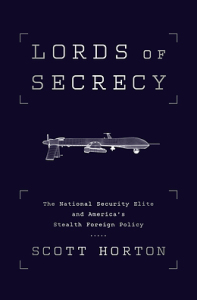

Senate Intelligence Committee Torture Report: Attorney Scott Horton
Guantanamo suicides, CIA interrogation techniques, CIA ordered physicians who violate the Hippocratic oath, are topics of some recent articles by returning guest attorney Scott Horton. Last month, he was on Democracy Now to debate former CIA General Counsel John Rizzo on the question of declassifying a Senate Select Committee on Intelligence report about the agency’s secret detention and interrogation programs. His book Lords of Secrecy The National Security Elite and America’s Stealth Foreign Policy will be published January 2015.
Attorney Scott Horton:
- I think the results flow directly from the media coverage (ABC poll on Torture report)
- Now major publications and broadcasters that hedged using the word torture have stopped doing that. There are only a handful of media sources that won’t do it. NPR being one of them.
- The media also presents roughly twice as much time devoted to people justifying the use of torture techniques to those criticizing it.
- Barack Obama who should lead the push back has gone completely silent. It’s beyond silent he talked about “tortured some folks” making it very casual, and then he said the torturers were patriots.
- I thought it was electrifying reading. 90 percent of it I’ve heard about before and still when you read them in this clinical, plain, highly factual style and things were developed with a continuous flow with lots of background in decision making in Washington at the top and how all this effected what happened on the ground.
- As a consumer of Congressional reports this probably the single most impressive Congressional oversight report I’ve ever seen.
- It’s an excellent example of what the oversight committee should be doing all the time.
- They’re doing this with respect to a program which was essentially or very largely wrapped up by October 2006.
- We’re talking about 8 1/2 years ago.
- They’re only able to do this kind of review in any depth when its historical, not when its real time oversight, that’s disappointing.
- One thing that emerges from looking at these reports and the military reports is that there is a huge black hole which has never been fully developed and explored and that’s JSOC, its the military intelligence side.
- That escaped review within the DOD process and it escaped review in CIA process and its clear that there’s a huge amount there.
- I certainly don’t expect prosecutions to emerge for the next couple of years in the United States, but I see a process setting in that may eventually lead to prosecutions.
- On the one hand we’re seeing a dangerous deterioration in relations with Russia, is an aggressor, which has seized territory in the heart of Europe, is waging a thinly veiled war on one of its neighbors. That is very unnerving to the major NATO powers.
- On the other hand there’s never been a period in the history of the alliance when there is so much upset at the United States.
- That’s come largely from the rise of the surveillance state and the role of the NSA.
- I was looking at this report, and we know that in 2006, there was an internal review that led the CIA to conclude that these interrogation techniques were ineffective and the CIA internally decided to seek a large part of the authority for EIT’s and operation of black sites rescinded.
- Another thing that’s very important here from this report, it tells us that Michael Hayden, George Tenant, Porter Goss and other very senior people at the CIA repeatedly intervened to block any form of punishment of people who are involved with torture and running the black sites.
- That’s important because of the legal document Command Responsibility. The law says when command authority makes a decision not to prosecute and immunize people involved with torture and abuse, that results in the culpability of these crimes migrating up the chain of command.
- I interviewed CIA agents who were involved in this program, and they told me they’ve all been brought out by legal counsels office and told – they may not leave the country.
- That means you’ve got roughly 150 CIA agents, including many people near the top of the agency who can’t travel right now.
- Lords of Secrecy The National Security Elite and America’s Stealth Foreign Policy
Guest – Scott Horton, human rights lawyer and contributing editor to Harper’s Magazine. Scott’s column – No Comment. He graduated Texas Law School in Austin with a JD and was a partner in a large New York law firm, Patterson Belknap Webb & Tyler. His new book Lords of Secrecy The National Security Elite and America’s Stealth Foreign Policy.
————————————————————————-
CIA Sponsored Terror, Civil Liberties, Criminalizing Dissent, Habeas Corpus, Human Rights, Political Prisoner, Prison Industry, Surveillance, Targeting Muslims, Torture
Podcast: Play in new window | Download

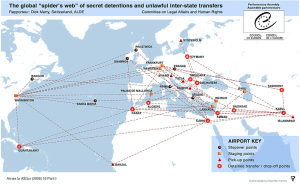
The Senate Intelligence Committee’s Report On CIA’s Detention & Interrogation
Attorney Michael Ratner:
- The Senate Committee on Intelligence started the investigation in 2007 after 92 tapes of water-boarding were destroyed by the CIA.
- That’s where the investigation began. In 2009, the Senate Committee still controlled by the Democrats spent 4 years going through millions of documents at a high cost to try and come out with a report on the CIA’s role on what they called detention and interrogation program.
- After 4 years they came out with a 6,700 in 2012 and they decided only to release the executive summary.
- Obama himself actually supported having more and more redactions.
- The redactions are stupid. Everybody knows in my field knows that Cobalt refers to what’s called the salt pit in Afghanistan which is a CIA run detention facility north of Kabal, or torture facility.
- Even if lives were saved its flatly illegal. You can’t kill a millions civilians because you want to save some of your soldiers.
- In the report they said that the CIA said before 911 that torture doesn’t work, its not effective.
- What Marnia Lazreg said in her book about torture in Algeria – she said it wasn’t really about information and it was about a macho empire that was in decline.
- What are you saying here – except this is about torturing Muslims, its about empire, and its about telling the world – you fall into our hands, we’re going to torture you.
- What they did was on the highest levels of the CIA, they went to places like the New York Times and the Washington Post and they wanted to be identified as a high level official and they leaked the stories of what they were doing in a way that would give them credit for it.
- I’m not hopeless about prosecutions, maybe not here, but somewhere in the world these people will be held accountable.
- This is only talking about what the CIA did at 9 dark sites around the world. The point I want to make is that there was torture going on at other places.
- 700 people went through Guantanamo, that’s the Rumsfeld techniques. Torture at Abu Gharib, torture at other U.S. prisons.
- We’re talking about a very small subset of U.S. torture.
- CIA sited Israeli Supreme Court ruling to justify torture. The Israeli ruling is that you can’t use torture except where there’s no other available means to prevent harm to other people.
- There’s no such thing as a ticking time bomb scenario that allows you to use it (torture)
- Go to CCRJustice.org, sign the petition
Attorney Michael Smith:
- The lying was more than I thought. The brutality was more than I thought. The corruption was more than I thought.
- On the lying, the report says no lives were saved as consequence to this program. We knew about water boarding but we didn’t know about rectal feeding or rectal hydration, where they left one man with a prolapsed rectum which means its hanging out.
- We didn’t know about killing people by chaining them to the floor in a cold room and dousing them with water.
- This program was run by 2 amateur psychologists, who didn’t know anything about Arab culture, who didn’t know anything about interrogation.
- They set up a corporation and the government gave them 81 million of our dollars to run this thing from 2001 to 2007, if you do the numbers these guys probably made 5 million dollars a year, less expenses.
- This is the most violent country in the world. The CIA is the epitome of this. Torture is illegal under American law, under international law. People who do it should be prosecuted.
- People who authorize it should be prosecuted, and there’s no talk about that.
Attorney Heidi Boghosian:
- My number one take away is something we’ve been covering for years is that no actionable intelligence came out as a result of these heinous practices.
- What also offends me greatly is hearing George W. Bush’s response that anyone who buys into this report or gives in credence, is somehow unpatriotic which fits into the whole propaganda that we’ve been fed, that questioning anything the government does, is an offense or an affront.
- These companies are profiting from torture.
——–
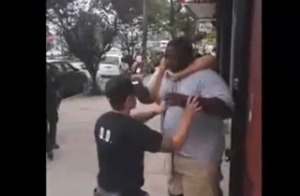

Eric Garner’s Public Defender Says Cops and Prosecutors “Are a Team in Every Case”
A recent Vanity Fair article titled Eric Garner’s Public Defender Says Cops and Prosecutors “Are a Team in Every Case” exposes the secrecy and conflicts of interest within investigations of police violence and how seven of the ten most-sued police officers of the 35,000-member New York Police Department happen to be in Staten Island. The article was written by attorneys Bina Ahmad, Joseph Doyle, and Michael Rooney public defenders in Staten Island with The Legal Aid Society. We also get a look inside grand jury proceedings and the often bias investigation from district attorney’s offices when looking into police wrongdoing. What steps are needed to structure fair court proceedings in these cases?
Attorney Bina Ahmad:
- Seven of the ten most-sued police officers of the 35,000-member New York Police Department happen to be in Staten Island.
- They still work there, they still testify in court, swear under oath, they’re telling the truth, they’re still violating our clients rights with impunity left and right, commit violent acts against them.
- The disparate treatment, of not only of the way our clients of color are treated, in a much more brutal way, but also in the way they’re charged and the plea offers that they’re given is very stark and very discriminatory in my mind.
- Many of us here at Legal Aid and other criminal defense attorneys around the city . . . we try to get the personnel records of officers who have been accused of brutality or violating people’s Constitutional rights, and (see) what they’ve been disciplined for within the NYPD.
- Abuses include – strip searching people on the street, full cavity search for people on routine stops, brutalizing people for not complying with a simple order.
- A few colleagues of mine had represented him (Eric Garner) in the past. Attorney Joseph Doyle was working to take a case to trial for him. A lot of people knew Eric Garner, and they called him the “gentle giant.” A large man, but known to be gentle and sweet, father of six.
- When the news came out that he was killed, it was incredibly difficult for us. Not only for us but for our clients.
- To task a local D.A’s office to prosecute one of their own, a local member of the local police department, particularly in such a small borough, you’re expecting them to prosecute a member of their own member of their team.
- Every judge knows they have to recuse themselves from a case if they have a relationship with any of the parties involved.
- With the D.A. they don’t have that obligation. They work on cases together. They prep them for testifying at trial to be a prosecution witness.
- Choke holds were banned as a practice a while ago as part of police protocol. The fact that a police used one was a violation of police protocol.
- We are not allowed in the grand jury room for any moment except for if your client chooses to testify. If our client chooses to testify, we can’t protect them at all.
- They take the stand, they’re cross examined by the D.A. Everything they say can and will be used against them later.
- The D.A. control everything, the narrative, what evidence is shown, what witness testifies, what questions the witness is asked.
- It would be up to the grand jury to feel empowered to ask more questions.
- Any eye witness that would come in as a prosecution witness, where they’re supposed to be getting an indictment on a cop. They’ll be testifying for the prosecution but what we’ve seen in these minutes is the way the district attorney these prosecution witnesses – they’re acting like they’re cross examining them.
- They’re actually trying to break down their testimony or poke holes in their testimony.
- They suddenly become a defense attorney when the cop is on the line.
Guest – Attorney Bina Ahmad, staff attorney in the criminal defense practice department of the Legal Aid Society and National Vice President of the National Lawyers Guild.
——–

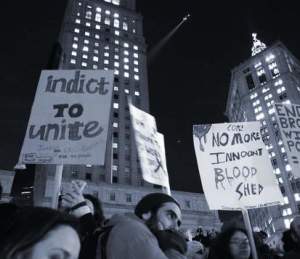
Foley Square Demonstration: Voices From The Protest
We hear some of the voices of demonstrators assembling at Foley Square during the first protest against the grand jury decision failing to indict those officers responsible for choking Eric Garner to death.
————————————————————————————————-

Please help support Law and Disorder by clicking on Fractured Atlas graphic (link is fixed). This radio show is now a sponsored project of Fractured Atlas, a non-profit arts service organization. Contributions for the charitable purposes of Law and Disorder must be made payable to Fractured Atlas only and are tax-deductible to the extent permitted by law. You can donate as little as 5.00 a month.
CIA Sponsored Terror, Civil Liberties, Criminalizing Dissent, Death Penalty, Guantanamo, Human Rights, NSA Spying, Political Prisoner, Surveillance, Torture, Truth to Power
Podcast: Play in new window | Download
Updates:
Michael Ratner: Is Congress’ Decision On Obama’s Plan To Close GTMO Really A Setback As Newspapers Report?
- Congress was considering whether to allow Guantanamo detainees to be resettled in the United States.
- That’s something Obama wants to do because so far he’s been unwilling to settle them in other countries.
- That bill failed and so when we get the NDAA or whatever legislation it will be put in, it will have transfer restrictions of a sort but it will not permit detainees to be transferred to the United States.
- Obama has had 6 years to make good on his promise that he would close Guantanamo in a year.
- Guantanamo remains, more than 142 people. More than half 73, have been cleared for release.
- On January 11, 2015, I urge all of us to get in the streets demonstrate and tell Obama to shut it down.
——-
Michael Ratner: The Right Livelihood Awards In Stockholm, Sweden
- I just came back from Stockholm, Sweden where the Right Livelihood Awards, also known as the alternate Nobel Prize are given out annually.
- Amy Goodman has received such an award. This time there were five awardees.
- One of whom is Edward Snowden. That was one of the reasons I was there because who are involved in defending protecting whistleblowers were in Stockholm for that award.
- The awards are not given by the Swedish government. Sweden is not a progressive government. It’s tied with Israel as the 3rd biggest arms dealer in the world.
- Sweden did recognize that Palestine should be a state.
United Nations Committee May Question U.S. Officials On Handling Of Michael Brown Shooting
——-
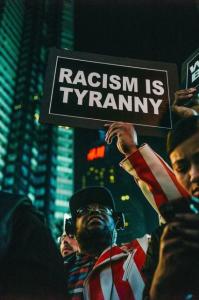

Ferguson: It is Right to Resist, By Any and All Means Necessary
Two weeks after the non-indictment of former officer Darren Wilson over the killing of Michael Brown, protests continue nationwide from classrooms to places of work. Will a genuine movement gain traction in the wake of outrage and defiance to the grand jury decision? A movement coalescing against police violence will need to confront police, and resist the legitimacy of the state writes Glen Ford founder of the Black Agenda Report. He says the people of Ferguson’s mass violations of the curfews and countless decrees of the militarized city, county and state police were, by definition, illegal acts – which is what made the small town a model of resistance.
Glen Ford:
- Not to belittle all the work people have put into this. There’s been a pent up energy that has been building and I mean for literally decades. We have to compare this explosion as you call it of activism to the period of quietude for decades even as the contradictions that led to Michael Brown’s murder and a multitude of murders kept on becoming more acute.
- We have to understand that there were forces that were keeping a lid on the explosion, and finally those forces could no longer do so and we see the explosion in 170 or more cities.
- Black folks have never trusted the police and never had any reason to trust the police. It’s never been about trust its been about power. The power of a community to protect its youth, its sons and daughters from being gunned down on the streets by these police or sucked up into the mass black incarceration machinery.
- The helplessness has not been something inherent to black folks its because we’ve had a kind of fifth column in our midst that we at Black Agenda Report call the black misleadership class which has engaged in very enthusiastic collaboration with the same people who created this black mass incarceration state.
- Back in June there was a vote in the house and the senate on a bill that would’ve prevented the Pentagon from transferring its weaponry and all of its militarized gear to local and state police departments.
- Four out of five Congressional Black Caucus members either voted against that bill or abstained. 32 out of the 40 members, so 80 percent of the Congressional Black Caucus. I guess its fitting that they stand in for this black misleadership class. They were financing the murder of people like Michael Brown.
- So, this is our problem, that these are the people that keep the lid on.
- What should be an ongoing, not simmering distrust, but an ongoing explosion of resistance.
- All of this started in terms of legislative form with the Law Enforcement Assistance Administration that was part of an omnibus crime bill that was passed in 1968 signed by Lyndon B Johnson which began by transferring massive federal resources to local police departments.
- It’s been gradual, steady and now institutionalized.
- This is the movement that does not yet have a name and it doesn’t have a name because its not yet clear about its objectives.
- The response to this civil rights and black power movement was the mass black incarceration state.
- Community control of the police and its a very very difficult subject. It was the subject that the Black Panther Party was born to tackle.
- The community should be empowered to fire police, just like communities are being empowered through their mayor to fire teachers.
- This movement can’t treat police as legitimate, that is coercive mechanisms of the state.
- Their police, their security apparatus, their intelligence apparatus has to be seen and opposed as illegitimate.
- He’s always in a huddle with President Obama (Al Sharpton) and that’s why I call him “king rat.”
- The real ratting that he does is that he goes across the country and he makes an assessment of who is in opposition to the administration’s policy or mass incarceration order and then goes right back to the commander and chief of the regime and tells him who might be creating trouble and how those troublemakers can be neutralized. That’s the real rat.
- Mass arrests and provocateurs and such. This is what Sharpton’s really talking about when he talks about the full weight of the president’s office.
Guest – Glen Ford, founder of the Black Agenda Report and many other media forums. Ford was a founding member of the Washington chapter of the National Association of Black Journalists (NABJ); executive board member of the National Alliance of Third World Journalists (NATWJ); media specialist for the National Minority Purchasing Council; and has spoken at scores of colleges and universities.
——-

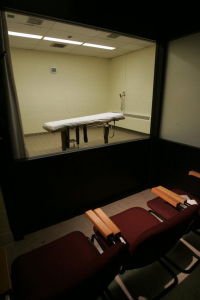
Ohio Republicans Push Law to Keep All Details of Executions Secret
Republican lawmakers in Ohio are rushing through one of the most extreme secrecy bills yet attempted by a death penalty state. It’s called HB 663 and it withhold information on every aspect of the execution process from the public, media and even the courts. Ohio has experienced four botched executions in eight years. The most recent was the 26 minute death of Dennis McGuire in January 2014. An experimental two-drug combination was used and it was reported that Dennis was gasping and fight for breath. Another aspect of HB 663 is that seeks to undermine strict distribution controls that have been placed on foreign companies that manufacture pentobarbital.
Attorney Mike Brickner:
- They’re really trying to ram through the last few weeks of our lame duck session.
- I think they want to resume executions here in the state of Ohio in 2015.
- We’ve had a moratorium on executions since the beginning of 2014 when we had a botched execution of Dennis McGuire and the federal court has been trying to come with new protocol, new drugs that won’t lead to a botched execution.
- I think the legislators want to move forward with the next scheduled execution in February so they’re trying to push it through as quickly as possible.
- I think they’re interested in secrecy because of all the controversy that has plagued Ohio executions over the last decades.
- I think this a natural concern from the government – when something is not going well, they want to hide it from the public.
- Unfortunately that never really works out well for the government because when you operate in secret, the only things that follow are corruption, abuse, negligence and incompetence.
- The legislation would shield anyone who really touches the lethal injection process from public records laws.
- For those medical professionals who advise or assist on the executions, it would prevent the state licensing board from holding them accountable for violating their oath.
- Unfortunately bad ideas often travel quickly. We have five states with secrecy legislation of some sort in place, we have 15 states that tried to enact secrecy legislation.
- Compounding pharmacies are smaller companies, often one or two pharmacists. They make small batches of drugs made to order. They’re not regulated in any meaningful way by the FDA.
- When they make these drugs in small batches, one batch could be more effective or less effective than another batch. When you’re talking about a lethal injection where you need to insure a humane and constitutional way, if you have a drug that’s being used in the lethal injection process that’s not effective, you have a very high chance of that person going through an execution that will violate our constitution.
- We have to accept that the death penalty does exist in states like Ohio and if we are to have the death penalty then we need to make sure that it complies with our laws and that those who are subjected to the death penalty are not treated inhumanely and in a way that will violate our constitution.
- I think we can do that while moving toward abolishing the death penalty.
Guest – Attorney Mike Brickner, senior policy director of the American Civil Liberties Union (ACLU) in Ohio. Brickner recently opposed the new bill in front of a committee at the Ohio State legislature. In 2013, Mike co-authored two reports focusing on the intersection of poverty and the criminal justice system. The Outskirts of Hope: How Debtors’ Prisons are Ruining Lives and Costing Communities chronicled how courts were illegally imprisoning low-income Ohioans because they could not afford to pay their fines. The report culminated in the Ohio Supreme Court increasing education and training for court personnel and issuing bench cards with clear rules for collecting fines and court costs. He also co-authored and designed the ACLU’s April 2011 report, Prisons for Profit: A Look at Private Prisons. The report highlights the problems faced by other states who have privatized prisons, including: increased costs, safety problems, a lack of transparency, and increased recidivism.
—————————————————————————–

Please help support Law and Disorder by clicking on Fractured Atlas graphic (link is fixed). This radio show is now a sponsored project of Fractured Atlas, a non-profit arts service organization. Contributions for the charitable purposes of Law and Disorder must be made payable to Fractured Atlas only and are tax-deductible to the extent permitted by law. You can donate as little as 5.00 a month.





















